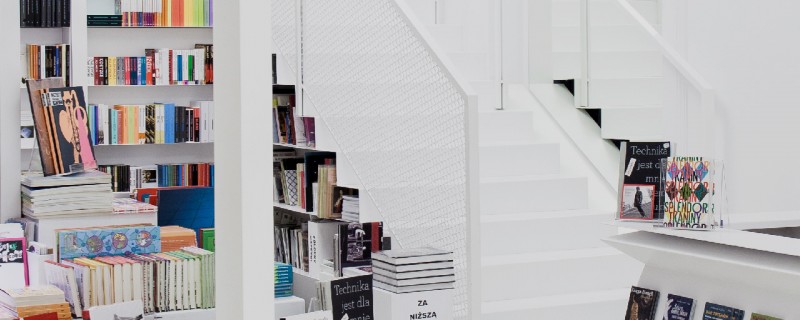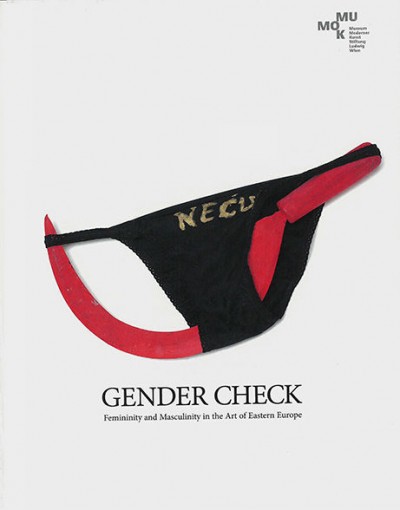
E-bookshop
edited by: Rainer Fuchs, Susanne Koppensteiner, Bojana Pejić, Christine Böhler
graphic design: Susi Klocker
publisher: MUMOK Museum Moderner Kunst Stiftung Ludwig Wien
ISBN: 978-3-86560-783-6
“Gender Check. Femininity and Masculinity in the Art of Eastern Europe” is the first comprehensive exhibition featuring art from Eastern Europe since the 1960s based on the theme of gender roles. 20 years after the fall of the Berlin Wall, the curator Bojana Pejić, along with a team of experts from 24 different countries, has put together a selection of over 300 works including paintings, sculpture, installations, photography, posters, films and videos. With over 200 artists, the exhibition paints an exceptionally diverse picture of a chapter in art history that until recently had been largely unknown and that could also act as an important addition to contemporary gender discourse.
“Gender Check” follows the changes in the representation of male and female role models in art – especially as they develop under different socio-political conditions. The exhibition, initiated and supported by the ERSTE Foundation, shows the interrelationship between art and history following both a chronological and thematic approach:
Up into the 1960s, heroic male and female workers were the dominant figures in the socialist realist tradition of art. The intended reality-transforming program of a “sexless society” propagated by the state was met with irony and unmasked by unofficial art at the time. Following the period of collective state utopian aesthetics, different individual and more open tendencies could be found on a local level – periodically provoking a hostile response – that created independent spaces for nonconformist art. Beginning in the 1970s, ideals of femininity and masculinity were reexamined beyond the propagandist clichés of the past: Self-portraits and representations of the body and subjectivity began to hint at a newfound self-confidence also reflected in openly displayed sexuality that called heterosexual standards and heroic ideals of masculinity into question. Even many of the abstract pieces worked with anthropomorphic forms and the relationship between the sexes within society.
The emancipation from role models went along with an emancipation from traditional means of expression, as new media and art forms like photography, film, video and performance became increasingly important. At the same time, more and more female artists began to gain in prominence. With the fall of the wall in 1989 and the end of socialist regimes, new challenges became evident in the face of rising nationalism and neoliberal influences from the west. The newly won freedoms came hand in hand with neoconservative role constraints that soon also became the topic of artworks. A critique of chauvinist, militaristic, misogynist and xenophobic ideologies were expressed in the context of feminist theory. Homosexuality began to be brought up. Clichés about motherhood and traditional religious-inspired ideals of femininity and patriarchal power structures came under critique. To underline the political and public significance of female identity, allusions came to be made to historical allegories of femininity.
artists:
Magdalena Abakanowicz, Irina Abdżandadze, Marina Abramović, Rovena Agolli, Gordana Andelić-Galić, Tatiana Antoszyna, Anita Arakelian, Arewik Arewszatian, Corneliu Baba, Maja Bajević, Arnis Balčus, Ana Baranovici, Mária Bartuszová, Vika Begalska, Emese Benczúr, Sokol Beqiri, Jerzy Bereś, Mária Berhidi, Klára Bočkajová, Geta Brătescu, Micha Brendel, Ozana Brković, Veronika Bromová, Violetta Bubelytė, Violetta Čapovska, Anetta Mona Chisa, Olesia Chomenko, Olga Czernyszewa, Eteri Czkadua, Lewan Czogoszwili, Alexandra Croitoru, C.U.K.T., Anna Daučiková, Vlasta Delimar, András Dér, Iskra Dmitrova, Milena Dopitová, Orshi Drozdik, Zenta Dzividzinska, Ágnes Eperjesi, Fabryka Ubrań Znalezionych, Grupa F.F.F.F., Barbara Falender, Wojciech Fangor, Eva Filová, Vera Fischer, Imre Gábor, Else Gabriel, György Galántai, Ugnius Gelguda, Rimma Gierłowina, Walerij Gierłowin, Ałła Gieorgijewa, Ludmiła Gorłowa, Katarzyna Górna, Tomislav Gotovac, Ion Grigorescu, Andris Grīnbergs, Igor Grubić, Marina Gržinić, Izabella Gustowska, Tibor Gyenis, Jusuf Hadzifejzović, Tibor Hajas, Angela Hampel, László Hartai, Merita Harxhi-Koci, Helēna Heinrihsone, Ieva Iltnere, Sanja Iveković, Elżbieta Jabłońska, Jelena Jelagina, Oleksandr Judin, Armine Kalentz, Kai Kaljo, Šelja Kamerić, Ilona Keserü, Erich Kissing, Eva Kmentová, Katarzyna Kobro, Aleksander Kobzdej, Běla Kolářova, Mihails Kornetskis, Maria Konstantinowa, Łukasz Korolkiewicz, Anna Kowszar, Jelena Kowylina, Katarzyna Kozyra, Stasys Krasauskas, Metka Krašovec, Oleg Kulig, Zofia Kulik, Ewa Kuryluk, Katalin Ladik, Stjepan Lahovsky, Leonhard Lapin, Denisa Lehocká, Ly Lestberg, Via Lewandowsky, Andriej Liankiewicz, Zbigniew Libera, LN Liga Kobiet, Lojze Logar, Zenta Logina, Claus Löser, Oleksandr Maszukow, Sarmĩte Māliņa, Dren Maliqi, Władysław Mamyszew-Monroe, Monika Mamzeta, Anna Margit, Vlado Martek, Živko Marušič, Goranka Matić, Wolfgang Mattheuer, Dóra Maurer, Snieguolė Michelkevičiūtė, Borys Michajłow, Jan Mlčoch, Yana Milev, Jarosław Modzelewski, Jadvyga Mozũraitė-Klemkienė, Muslim Mulliqi, Ismet Mujezinović, Marju Mutsu, Natalia LL (Lach-Lachowicz), Kriszta Nagy, Paul Neagu, Hajnal Németh, Ilona Németh, Arax Nerkararyan, Tymon Niesiołowski, Damir Nikšić, Grupa Oho, Mara Oláh, Tanja Ostojić, Teresa Pągowska, Neša Paripović, Helga Paris, Ewa Partum, Gyula Pauer, Felicita Pauļuka, Milija Pavićević, Lia Perjovschi, Zora Petrović, Wolfgang Peuker, Galina Pietrowa, Maria Pinińska-Bereś, Anu Põder, Tadej Pogačar, Marilena Preda Sânc, Nadežda Prvulović, Nurhan Qehaja, Jelena Radić, Mark Raidpere, Eglė Rakauskaitė, Rassim, Erna Rosenstein, Borjana Rossa, Liliana Rusewa, Swietlin Rusew, Teresė Marija Rožanskaitė, Sirje Runge, Walentina Rusu-Ciobanu, Warwara Sadowskaja, Zorka Ságlová, Horst Sakulowski, Anri Sala, Arvydas Šaltenis, Aidan Sałachowa, Duba Sambolec, Šarūnas Sauka, Christine Schlegel, Cornelia Schleime, Erzen Shkololli, Adriena Šimotová, Károly Sinkó, Fritz Skade, Mindaugas Skudutis, Džemma Skulme, Aina Šmid, Marek Sobczyk, Simona Sochranskaja, Virginijus Šonta, Zora Stančič, Sven Stilinović, Gabriele Stötzer, Gabrijel Stupica, Marko Šuštaršić, Aneta Svetieva, Ágnes Szabó, Alina Szapocznikow, Zsuzsa Szenes, Ágnes Szépfalvi, Győző Szilas, Ana Temkova, Evi Tihemets, Lucia Tkáčová, Raša Todosijević, Slaven Tolj, Jelena Tomašević, Milica Tomić, Mare Tralla, Zsuzsi Ujj, Gediminas Urbonas, Nomeda Urbonas, Mojsiej Wainstein, Rusłan Waszkiewicz, Ramona Welsh, Karla Woisnitza, Walter Womacka, Julita Wójcik, Ulf Wrede, Valie Export Society, Jitka Válová, Květa Válová, Žaneta Vangeli, Petra Varl, Sofija Veiverytė, Mio Vesović, Wiktor Zarecki, Aija Zariņa, Indulis Zariņš, Alicja Żebrowska, Jerman Željko, Jana Želibská, Doris Ziegler, Janja Žwegelj
texts by: Boris Marte, Christina Böhler, Bojana Pejić, Keti Czuchrow, Izabela Kowalczyk, Branislav Dimitrijević, Katrin Kivimaa, Edit András, Zora Rusinová, Hedwig Saxenhuber, Georg Schöllhammer, Suzana Milevska, Piotr Piotrowski, Martina Pachmanová
